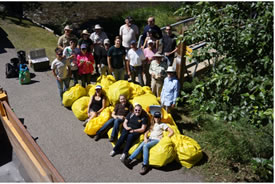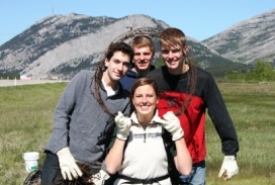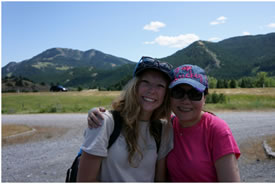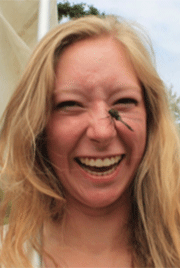Sustainability is the new buzzword

Conservation Volunteers cleanup event at the Crowsnest Pass, AB (Photo by NCC)
Sustainability is the new buzzword. You see it everywhere: everything that aims to be green is "sustainable" or "sustainably produced" nowadays. But what does this word, sustainability, mean?
According to www.dictionary.com, sustainability is “the ability to be sustained, upheld, supported, or confirmed.”
This is helpful, but still leaves some aspects of sustainability unaccounted for, such as, how long does something need to be sustained before it can be deemed "sustainable?"
Questioning the word sustainability is something I have done a lot in past years. I went to McGill University and decided that I would spend my life attempting to change the world. Luckily for me, I found a good start to my world-saving career with a degree called Sustainability, Science and Society. This was my first opportunity to question, and to understand, what the word sustainability really means.
I’m now aiming to implement and promote sustainability in my own life by taking action. This led me to the Nature Conservancy of Canada (NCC). As a Conservation Volunteers intern, I work towards achieving conservation and stewardship goals we have for Alberta by recruiting awesome volunteers to supply humanpower.
Conservation and sustainability go hand in hand

2010 Conservation Volunteers event, Crowsnest Pass, Alberta (Photo by NCC)
The longer I work here, the more I can tell that NCC aims for more than mere environmental protection. NCC strives for sustainability. The environment, and environmental sustainability, is crucial to conservation, but NCC understands that working with the communities who rely on natural systems and within the economies that these natural systems support are equally important aspects of sustainable conservation.
Volunteers building sustainable social networks
A good example is the Nature Conservancy of Canada’s work in the Crowsnest Pass. On July 26 2014, the Conservation Volunteers team joined forces with the Municipality of Crowsnest Pass and Crowsnest Conservation Society to pull invasive weeds along the Crowsnest River. By collaborating with these groups, we were able to meet many local people and build relationships. NCC works hard to foster the kind of relationships that make sustainable social networks.
Additionally, the Conservation Volunteers team has taken initiative this summer to buy more local foods through local businesses like SPUD. (see my article “Conservation Volunteers promoting conservation values...with their taste buds” for more detailed information!)
Battling invasives at the source
In addition to building friendships with the community during this event, we worked towards environmental sustainability by removing invasive species from along the Crowsnest River and Nez Perce creek. It is particularly important to pull weeds here because rushing rivers are ideal for seed transportation, meaning invasive weeds can more easily travel along this natural corridor.
As the Crowsnest River flows from British Columbia into Alberta, the Crowsnest Pass is one of the first lines of defence to protect Alberta from weeds. By reducing the number of invasives here, we are working to protect the rest of Alberta from invasive weeds. Talk about maximizing impact!

Conservation Volunteers cleanup event at the Crowsnest Pass, AB (Photo by NCC)
The three pillars of sustainability
All this is in keeping with what I have learned about sustainability in school. At McGill, I was introduced to a concept known as the three pillars of sustainability:
- economic
- social
- environmental
The idea is that you have to work within all three of these pillars in order to truly achieve sustainability.
Environmental sustainability is the most familiar concept: we need to create systems that avoid harm and perpetuate flourishing of nature and natural systems.

Making friends in the Crowsnest Pass, AB (Photo by NCC)
Social sustainability is similar: we must create systems that promote the flourishing of humanity and empowerment of people while resolving conflict in a harmless way.
Finally, economic sustainability implies a functioning economy that self-perpetuates and is steady in nature.
NCC and sustainable conservation
NCC works within all these domains, which in my opinion is why this organization has been so successful in achieving its conservation goals.
So there you have it. The definition of sustainability is still a topic of much debate, but that doesn’t mean you can’t move towards trying to achieve sustainability. I went from learning about sustainability to actually trying to save the world by working with the Nature Conservancy of Canada.
My challenge for you is to go out and make a difference, too.


